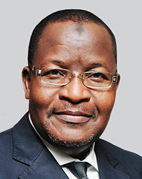- To Set Up Internet Code Of Practice
- Calls On Telcos To Take Action ,
- By Aaron Ukodie
The federal government is taking vigorous steps to tackle increasing danger of cyber-attacks to national security, corporate sanctity and individual safety. It has set up a National Computer Incident Response Team (CIRT), making it one of the 108 countries that have adhered to the call of the International Telecommunications Union (ITU) to implement effective mechanisms and institutional structures at the national level to reliably deal with cyber threats and incidents.
The CIRT seeks to ensure that telecommunication networks are secured and that all the benefits of the digital revolution to customers and users are not eroded and customers’ privacies not compromised.The global view is that the absence of such institutions and lack of national capacities poses a genuine problem in adequately and effectively responding to cyber-attacks and a National Computer Incident Response Teams (CIRT) play an important role in the solution.
The ITU has helped some of these countries to establish the National Computer Incident Response Teams (CIRT), which serve as a national focus point for coordinating cyber security incident response to cyber-attacks in the country.
The Nigerian Communications Commission (NCC) which is one of the arrow head in implementing the CIRT has also called on Nigerian telecommunications services providers to take practical steps to protect their networks and customers through building of fire walls.
At the 87the NCC organised Telecom Consumer Parliament held in Lagos today, the Executive Vice Chairman of the Commission, Professor Umar Danbatta said that Telecoms Service Providers operating in Nigeria would be expected, more than ever before, to strengthen their cyber-risk protection systems and architecture.
The telcos have also been asked to educate their consumers, regardless of their sizes and scopes of operations and equip them with tips they need to get protected while using the Internet on their networks.
Danbatta said NCC has set in motion the process of establishing an Internet Industry Code of Practice in accordance with its mandate to regulate the communications sector in Nigeria, as enshrined in the Nigerian Communications Act 2003.
The Code would clearly define the rights and obligations of Internet Access Service Providers with regard to the issues therein and to also protect the right of Internet users to an Open Internet. It shall also provide clear guidelines to Internet Access Service Providers on the use of traffic management practices and outline the obligations of Internet Access Service Providers in relation to the protection of consumers’ personal data and security among others.
Danbatta who called for a collaborative effort to tackle increasing dangers of cyber-attack said: “We also believe that the time has come for organisations and telecoms service providers alike, to begin to use next-generation authentication as against the hitherto username-password authentication system. The ITU, in a report, says the latter is vulnerable to hacking and all forms of cyber-attacks”, he said.
He said the Fourth Industrial Revolution, which offers opportunities for innovation, diversification, agility and cost optimisation, also carries with it an increased exposure to a new and jeopardising risk of cyberattacks.
“For us in Nigeria, as it is the case in other countries where access to and demand for broadband are increasing, we must be cognizant of the reality that access to broadband Internet has also brought unintended consequences of cybercrimes.
He said different criminal activities such as spamming, Subscriber Identity Module (SIM) card frauds, credit card frauds, Automated Teller Machine (ATM) frauds, phishing, identity theft, unauthorised access, distribution of obscene and indecent contents, cyber bullying, among several other forms of sophisticated cyber-criminal activities are being perpetrated within the cyberspace.
Danbatta noted that the cyberspace has become a blossoming haven for cybercriminals to perpetrate their insidious acts which have continued to cost unsuspecting Internet users and many organisations billions of naira in lost money and revenue and most times, the main target of cybercrimals is to steal information, passwords or the identity of genuine internet users for selfish profiteering.
Stakeholders, among telecom operators, consumers’ advocacy groups who gathered to discuss this year’s telecom parliament theme titled “Challenges of Cybercrime: The Role of the Telecoms Service Providers were unanimous in calling for collaboration by all in tackling cyber-attacks and the need for customers to be educated on the growing threat.
The EVC said Nigeria has surpassed the 30 per cent broadband penetration target expected to be achieved by December, 2018, as contained in the country’s National Broadband Plan (NBP) 2013-2018.
NCC believes that the Telecom Parliament suggestions would help Telecoms Service Providers and other Intemet-dependent organisations in sustaining their activities in an increasingly-connected world and containing the menace of cybercrimes on their finances and reputation, on their employees and customers.














